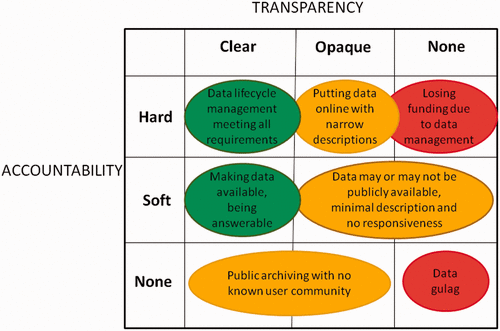Difference between revisions of "Template:Article of the week"
Shawndouglas (talk | contribs) (Updated article of the week text.) |
Shawndouglas (talk | contribs) (Updated article of the week text.) |
||
| Line 1: | Line 1: | ||
<div style="float: left; margin: 0.5em 0.9em 0.4em 0em;">[[File: | <div style="float: left; margin: 0.5em 0.9em 0.4em 0em;">[[File:Fig1 Mayernik BigDataSoc2017 4-2.gif|240px]]</div> | ||
'''"[[Journal: | '''"[[Journal:Open data: Accountability and transparency|Open data: Accountability and transparency]]"''' | ||
The movements by national governments, funding agencies, universities, and research communities toward “open data” face many difficult challenges. In high-level visions of open data, researchers’ data and metadata practices are expected to be robust and structured. The integration of the internet into scientific institutions amplifies these expectations. When examined critically, however, the data and metadata practices of scholarly researchers often appear incomplete or deficient. The concepts of “accountability” and “transparency” provide insight in understanding these perceived gaps. Researchers’ primary accountabilities are related to meeting the expectations of research competency, not to external standards of data deposition or metadata creation. Likewise, making data open in a transparent way can involve a significant investment of time and resources with no obvious benefits. This paper uses differing notions of accountability and transparency to conceptualize “open data” as the result of ongoing achievements, not one-time acts. ('''[[Journal:Open data: Accountability and transparency|Full article...]]''')<br /> | |||
<br /> | <br /> | ||
''Recently featured'': | ''Recently featured'': | ||
: ▪ [[Journal:Recommended versus certified repositories: Mind the gap|Recommended versus certified repositories: Mind the gap]] | |||
: ▪ [[Journal:Usability evaluation of laboratory information systems|Usability evaluation of laboratory information systems]] | : ▪ [[Journal:Usability evaluation of laboratory information systems|Usability evaluation of laboratory information systems]] | ||
: ▪ [[Journal:Data management: New tools, new organization, and new skills in a French research institute|Data management: New tools, new organization, and new skills in a French research institute]] | : ▪ [[Journal:Data management: New tools, new organization, and new skills in a French research institute|Data management: New tools, new organization, and new skills in a French research institute]] | ||
Revision as of 16:13, 20 December 2017
"Open data: Accountability and transparency"
The movements by national governments, funding agencies, universities, and research communities toward “open data” face many difficult challenges. In high-level visions of open data, researchers’ data and metadata practices are expected to be robust and structured. The integration of the internet into scientific institutions amplifies these expectations. When examined critically, however, the data and metadata practices of scholarly researchers often appear incomplete or deficient. The concepts of “accountability” and “transparency” provide insight in understanding these perceived gaps. Researchers’ primary accountabilities are related to meeting the expectations of research competency, not to external standards of data deposition or metadata creation. Likewise, making data open in a transparent way can involve a significant investment of time and resources with no obvious benefits. This paper uses differing notions of accountability and transparency to conceptualize “open data” as the result of ongoing achievements, not one-time acts. (Full article...)
Recently featured:










